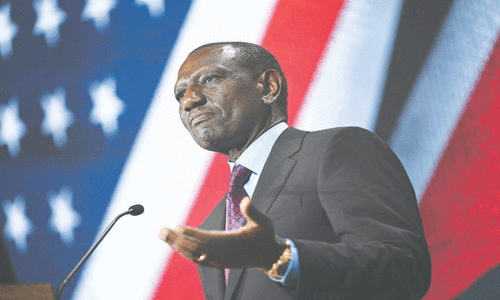 AGRA: An ownership battle has erupted over the world’s most famous monument to love, the Taj Mahal, as it celebrates its 350th anniversary. The magnificent 17th-century structure built by Mughal Emperor Shah Jahan as a tomb for his beloved queen, Mumtaz Mahal, is owned and managed by the Archaeological Survey of India as a national monument.
AGRA: An ownership battle has erupted over the world’s most famous monument to love, the Taj Mahal, as it celebrates its 350th anniversary. The magnificent 17th-century structure built by Mughal Emperor Shah Jahan as a tomb for his beloved queen, Mumtaz Mahal, is owned and managed by the Archaeological Survey of India as a national monument.
But the Sunni Waqf Board, which oversees Sunni graveyards and mosques throughout India, has staked a claim to the white-marbled tomb, saying since the monument houses Muslim graves, the Taj belongs to it. The Taj in Agra in the northern state of Uttar Pradesh contains the tombs of Shah Jahan and his queen along with other tombs.
Contradicting the Muslim claim, a hardline Hindu outfit, the Vishwa Hindu Parishad (VHP or World Hindu Council), says the Taj Mahal’s builders constructed it after demolishing a Hindu temple dedicated to Shiva, one of the most important gods in the Hindu pantheon. The Hindu group says the monument should be declared a temple and adds the key to the mystery lies in a sealed basement in the Taj that it says contains the “pillars and artefact of a temple”.
On either side of the massive platform on which the Taj stands are steps down to the basement that has been locked for as long as people can remember. “If the basement is opened, it’ll reveal the truth. I know it contains Hindu pillars and temple artefacts,” said Agra VHP leader Raghvendra, who goes by only one name.
Former MP Subramanian Swamy, head of the regional Janata Party, recalled he was not allowed to see the basement when he visited the Taj in 1978. “I was later called by (former prime minister) Morarji Desai who said I should not press the matter as it was in the national interest that the basement be kept sealed,” he told AFP. “The government has something to hide and the issue should be thoroughly investigated.”
The Waqf board, which under powers granted to it under India’s 1950 constitution can summon witnesses and decide cases involving its interests, is to hold a hearing on Friday to which it has summoned the Archaeological Survey.
The survey is to present its response to the board’s show-cause notice asking why the Taj cannot be handed over to the Waqf board. If the two sides cannot agree, the case will go before the courts.
Archaeological Survey officials did not return calls for comment. But Archaeological Survey administrator Ghulam Ali Qamar, the custodian in charge of the Taj between 1958 and 1976, says no one knows what is in the basement.
“We once tried to drill a hole to see what’s inside but the walls are so thick we couldn’t even make a dent,” he said.
Waqf chairman Hafiz Usman said the body would do everything it could to establish its claim to the Taj and says “we will go all the way to the Supreme Court to get the Taj.”
“These people can say anything but the fact remains the Taj was built by Shah Jahan and it has graves. Therefore, it is Waqf property,” Usman said. The Waqf is also laying claim to seven per cent of the around three million dollars paid annually by the 2.3 million tourists it draws each year.
Usman said if the issue was not resolved amicably, it could turn into another flashpoint like the demolished Babri mosque in Ayodhya, also in Uttar Pradesh.
“Some aggressive elements in the VHP will begin praying at the Taj and we could have another Babri,” he said.
Usman said nothing would change if the Wafq Board were awarded title to the Taj Mahal. “The Taj will always be remembered as built by Shah Jahan. It will only be owned by the Waqf for administrative purposes,” he said.
Historian Akhilesh Mithal, an expert in Indian historical monuments, said there was no truth to Hindu claims that a temple preceded the Taj.
“There’s clear evidence the land to build the Taj was purchased from the Maharajah of Jaipur,” Mithal said. “I’ve seen a map which clearly shows there was only a garden on the land where the Taj stands. There was no temple.”
Regarding the Waqf claim it is their property, he said the body had no claim to the Taj as it was only set up after India’s independence in 1947.—AFP














































Dear visitor, the comments section is undergoing an overhaul and will return soon.